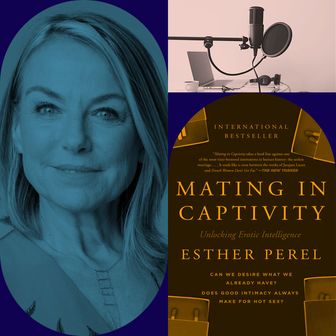
Esther Perel is a psychotherapist, a best-selling author, and the host of the podcast Where Should We Begin? — she’s also a leading expert on contemporary relationships. Every other week on the show, Perel plays a voice-mail from a listener who has reached out with a specific problem, then returns their call to offer advice. This column is adapted from the podcast transcript — the show is now part of the Vox Media Podcast Network — you can listen and follow for free on Apple podcasts or wherever you listen.
The Message
Hi, I have been with my boyfriend for two years now, and I am super-happy in this relationship. But we are also very different. We come from really different places. I am Middle Eastern. He is white. I immigrated to this country when I was a kid, grew up with a single mom, lived in a multigenerational household, and didn’t have a lot of money growing up, and he had kind of the opposite upbringing, growing up in the typical American sheltered suburb. And I knew that things weren’t fair, that things were unequal on a lot of different levels, but it didn’t really get to me. What I’m struggling with now is the feeling of how unfair it is as opposed to just the knowledge of it.
The Phone Call
Esther Perel: I was listening to your message, and I thought since you’ve had some time after you left it, ask me the question again.
Caller: I sometimes recently have been feeling resentful, and I think that my resentment is toward greater inequalities. But I think that I’m projecting those inequalities onto my boyfriend. What do I do with that resentment?
Esther: How does the resentment speak? How does it manifest?
Caller: I just get angry, and I keep it inside. But I think it comes out in passive-aggressive ways towards him, making him feel like he’s doing something wrong when really he’s not doing anything.
Esther: What does it say? How does it speak? What does it do? How does it snap?
Caller: It’s kind of like, How dare you take advantage of the easy option when I have to do it the hard way? It’s like, You don’t understand how easy you have it, and you don’t appreciate what you have. And I wish it was harder for you, too.
Esther: If it was harder for you, you’d understand a little more about how hard it is for me. Is this a secret topic, a hidden topic, or is this out in the open?
Caller: It’s out in the open; it’s relatively recently that I realized it’s even a topic for me.
Esther: What triggered it?
Caller: First, it was that we kind of work in similar fields, and living together I get to see the ins and outs of his financial life and of mine. And he makes significantly more than I do. And then it was small things like taxes. His dad was able to pay for an accountant, and I had to pay quite a bit of money for mine. And just learning more about his family’s financial situation and comparing it to mine and our future together.
Esther: And when you brought it up?
Caller: With the tax thing, I just brought up, “I’m having some feelings around you not going with this accountant service and relying on your dad’s accountant,” which then leads to, “Well, do you want me to use the same service that you use, even though I have this other option available?” And, of course, it’s not true, but then we end up in this kind of quiet space of each hurting a little bit. Me because I have the resentment, and him because he’s like, Why is this my problem now?
Esther: Can I ask you something?
Caller: Sure.
Esther: If I asked him what drew you to each other, would I hear something to the effect of “She worked really hard to get to where she is. I admire her strengths.”
Caller: Yeah, you would.
Esther: So he is not oblivious to your reality. He understands that. Where did you come from?
Caller: Iran.
Esther: Does he know more than just the name of the country? Does he know a bit of the situation?
Caller: Yeah, yeah. He knows quite a bit, and he’s very close with my mom.
Esther: Okay. So basically you have a good start. It means he’s not oblivious. He knows probably quite a bit about what it took to get here, what it took to start here. Is it fair to assume that you also put money aside to help your mother if she needs it?
Caller: Yeah, absolutely.
Esther: Right, your salary is not just for you. Your income is not only for you, and he probably respects it and maybe even admires it. Yes so far?
Caller: Yes, absolutely.
Esther: Right. So when your resentment becomes activated and it wants to say, “You don’t understand,” it is not exactly true. It is the way resentment talks, but resentment sometimes is biased too. And on the other side of resentment sometimes is loss, longing, envy. Like “I wish I could have it sometimes easy like you.” Not just “I wish you would have it as hard, as very hard, so you would understand what hard means to me.” And it’s not really sure that you even want him to have it so easy or that you want to have it so easy because there’s a part of you that probably admires your skills, your strengths, your grit.
Caller: That’s totally true. I think there is quite a bit of envy in there as we think about building our lives together, and suddenly there’s this option to have it be easier because I’m with someone who has it easier. That seems appealing, but at the same time, there’s always, in the back of my mind, the thought that if this ends, I’m back to my immigrant life. It’s hard again. And I’m envious that, for him, it’s kind of an option. He’s opted into this and into thinking about this, and for me, it’s not. But you’re right. I do feel strong, and I am proud of myself, and I am totally aware that has come from what I’ve experienced in my life. So it’s complicated.
Esther: Yes, it’s complicated. It’s layered. It’s not this or that. But you’re right. He chooses, but you know what? So have you. Because if I was asking you what drew you to him, somewhere, I’m imagining, you’d tell me that part of what you appreciate in him is his curiosity and his deep interest in you and your life experience and your family’s experience and the world and the politics outside of this country, et cetera. And that he comes from a strong family.
Caller: That’s true.
Esther: And that what draws you to him is his nuclear family, the kind of bonds they have with each other. The stability that represents the continuity in his family can have the opposite of the disruptions and the breaches that took place in your family.
Caller: Yeah. At the same time, his family did — they split up later than mine did, but they did. I don’t think I could have been with him, or anyone for that matter, who hadn’t had some of those issues in their own life.
Esther: Which issues?
Caller: Of a family divorce of some kind, some kind of pain or something. That sounds kind of harsh, but, you know, something to compare it to something, to help you have empathy.
Esther: It’s not harsh. It’s not harsh at all. Your family, there was — the loss in your family came through divorce?
Caller: Yeah and separation.
Esther: Separation of what sort?
Caller: Physical. My dad is not in this country.
Esther: Right. But because by choice or —
Caller: By choice. Yeah, there was a divorce, then we came here.
Esther: And what you say is “Having someone else who also experienced a breakup in the family, who also experienced loss and pain from within the family, is a point of identification that we have with each other. That is very important to me. So he may come from privilege, but there is something about loss inside the family and what that feels like that we do share. And for me, knowing that someone had experienced some tragic element in his life was very important. He wasn’t just the coaster all over the place.”
Caller: Yeah. He’s not that guy. And yeah, that is important to me.
Esther: Okay. So now you sit with him and you tell him, “You know, I realize as we live closer together and we live in the same home, it’s like I get to see what I had and what I didn’t have by looking at you. You probably do the same with me, and I get to see how you’ve come to expect certain things by virtue of how you grew up, and same for me. And I get to see the way where we see the world as something that is stable and consistent, and the places where we see the world as more precarious and fragile. And this is not a problem that we need to solve. This is a reality that we learn to live with.”
Caller: Yeah, I guess that’s the answer right there. It’s just ongoing.
Esther: If you stay with this man, this will be accompanying your story for the rest of the duration of your story. And you either make it a complementarity, where you sometimes envy him but also sometimes have lots of gratitude for it, appreciation for it, joy for what it gives you — for you and your mother, for that matter. Otherwise, what happens is that one of the very things that drew you to each other then becomes the source of conflict. You wanted it, but now you are fighting with it. Do you have differences around wastefulness and things like that?
Caller: It’s funny you use that word. Yeah, we do. I’m much more careful.
Esther: And do you use it to snap at each other, or do you see it as a difference, or do you actually say, “I could learn a little bit from you”?
Caller: Yeah. I think he’s better at this than I am. I do kind of snap. Like, there’s not a mind-set of abundance usually for me. So it’s hard to get out of that, and I snap at him. But he’s so much more able to just accept the word different and be happy about that. And I’m trying to do that too.
Esther: Right. But I will tell you something: You didn’t always want to have to be so frugal, so careful, so counting, but you had to. And a part of you wished you didn’t have to, but a part of you is afraid that since life could, at any day, put you back in scarcity mode, you better just keep on with the program.
Caller: Yeah.
Esther: It’s not what he is or is not doing; it’s also what it evokes inside of you. If you ask him to do the way you do, it’s because you’re asking him to resolve your internal conflict. “If you do like me, then I don’t have to think about the fact that there isn’t just this way of being.” You got it?
Caller: Yeah.
Esther: All right. Is this a good start?
Caller: Yeah. This is a start.
Esther: So I’m inviting you to go and have one of the first of many conversations that you need to have with him about this, but this is going to accompany the two of you. This is for the rest of your relationship. This is part of your relationship. It’s in the mortar. It’s not a problem that you need to solve.
Caller: Yeah. Okay. Thank you.
Esther: Good luck.
This transcript has been edited for length and clarity.
More From Esther
- How Does Esther Perel Do It?
- ‘Why Is My Husband So Boring?’
- Esther Perel Has the Hots for Philadelphia









